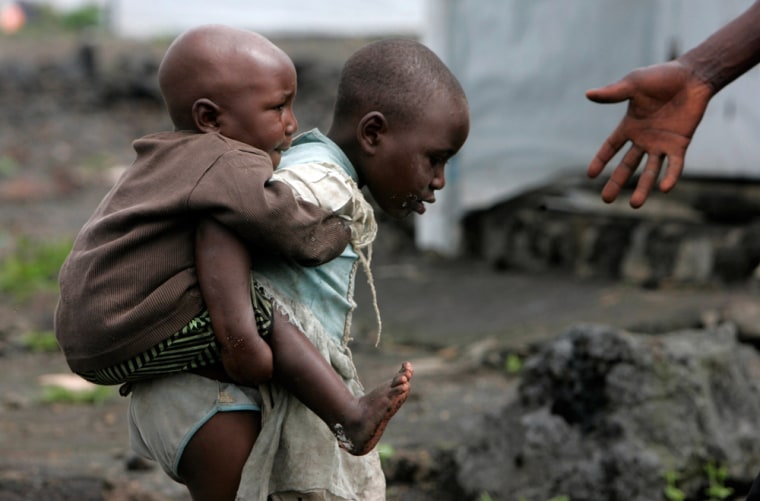Rebecca Nyiringindi scanned the sprawling refugee camp in eastern Congo, searching for just one person among the thousands of hungry and homeless.
"My mother's name is Alphonsine," the 10-year-old said, speaking softly while sucking her thumb. "She's short. She's very dark."
Helped by returning aid workers, more than 150 children began searching for their parents Thursday in a camp in Kibati as soldiers and rebels guarded a tense front line just miles away, raising fears that fighting would resume in the fragile, mineral-rich region.
Some 70,000 refugees have fled to Kibati from surrounding towns since fighting in eastern Congo intensified in August, displacing at least 250,000 people despite the presence of the largest U.N. peacekeeping force in the world.
Agencies registering children
Aid agencies took advantage of a lull in fighting this week to return to camps near the front line and resume registering children who have been separated from their parents during the ongoing conflict in Congo's North Kivu province.
Some children are clearly traumatized by the separation. Zawadi Bunzigiye, 6, stared down at her grubby blue dress and said, in a voice barely above a whisper, "I'm afraid of bullets."
Many children fled with only the clothes on their backs.
When fighting erupted Oct. 27 in the rebel-controlled town of Kibumba, about 12 miles from the camp, Rebecca Nyiringindi fled on foot, accompanied only by the family's goat.
"But I lost it," she said. "It was a chocolate (colored) goat. It was a big goat."
She said her parents sent her to the camp, believing she'd be safer there.
"The military came in. I was afraid," she said. "I hid next to the radio tower. My parents said, 'Go, we'll come after you.' I went along the road and I didn't see them."
Drunk soldiers rape girls
But the camp is no place for children. There are no schools. Children run underfoot all day, dodging waves of new arrivals. At night, residents say in whispers, drunk soldiers come through the camp, raping women and girls.
Neema Maombi, 8, fled the northern town of Nyanzale, about 60 miles from the provincial capital of Goma, in early September with her sister Solange, 16. Her account of being caught in this complicated conflict is simple.
"I heard bullets," she said. "I ran."
When asked to describe her parents, she said, "My mother is small. My father is short.
"My mother makes good food, like potatoes and beans," she added with a shy smile. "She makes banana beer."
Separated from families
UNICEF estimates that hundreds of children have been separated from their families since fighting flared up in August, and that overall more than 1,600 children in the province are seeking their parents.
Just 17 children have found their parents in the last three days in Kibati. In the meantime, they are taken in by other families, who serve as temporary foster parents.
"Children who are separated are particularly vulnerable to abuse, exploitation, violence and recruitment into armed groups," said UNICEF spokesman Jaya Murthy, who added the agency had not received specific reports of any abuses in recent days.
Save the Children said the youngest registered separated child at Kibati was 3, the oldest 17.
The children's youth and inability to give detailed information — plus the lack of official records in the Congolese countryside — make it even more difficult to track down their families. And family members may still be hiding or trapped.
"We're doing everything possible to find the families of these children," Murthy said. "But we're talking about tens of thousands of people who have fled. It's just not that easy to find where these people have gone."
A mix of causes behind conflict
Congo's conflict is caused by a mix of vast mineral wealth, a corrupt and ineffective government, armed militias and fallout from Rwanda's 1994 genocide, after which many Hutus who participated in the genocide fled Rwanda for the safety of Congo.
Rebel leader Laurent Nkunda says he is fighting because the Congolese government has not done enough to protect his minority Tutsi ethnic group from Hutu militias.
Aid agencies say they are concerned about children's vulnerability to malnutrition and communicable diseases.
One child squatted by a muddy stream and used a plastic bag to draw water out of a muddy stream. He then drank the bag's opaque brown contents. Downstream, others played in the brackish water. Another child walked by, hunched over with one jerry can of clean water in one hand, one strapped to her back and another balanced on her head.
Another child, no more than 3 years old, walked in a filthy green dress that was slipping off her left shoulder. Camp occupants said they did not know where her parents were.
She stopped just a few feet from a Congolese soldier, who appeared to have taken up residence in the camp despite aid agencies' refusal to assist combatants. He staggered forward, his two rifles akimbo, and demanded food and money from a reporter.
The little girl began to look around and whimper. He yelled at her to stop.
She started to scream.
